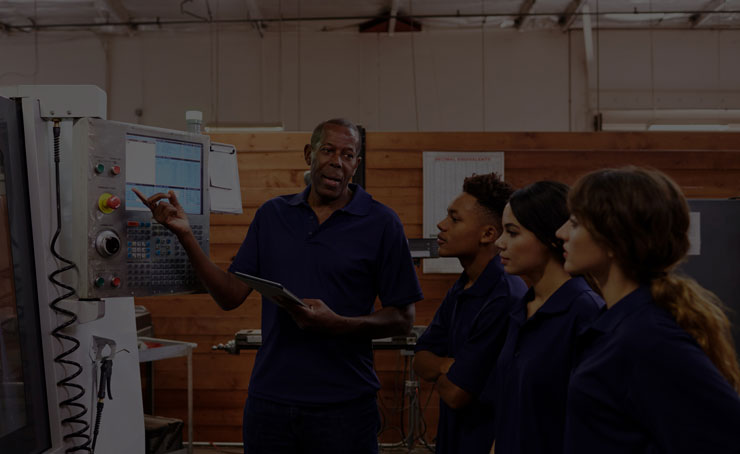Be a Blog Subscriber
Join thousands of manufacturing leaders and professionals who get the Accelerate blog delivered straight to their inbox


We recently caught up with our friends at Dixon Valve. Working with the Maryland Manufacturing Extension Partnership (MD MEP), Dixon created a comprehensive competency-based apprenticeship program that, in turn, inspired a company-wide focus on workforce development.
Headquartered in Chestertown, Md., with distribution centers around the globe, Dixon has grown to become a leading innovator in the hose coupling industry. Like many manufacturers, Dixon recognizes the urgency of recruiting, training and retaining their workforce.
“Training is at the forefront of organizational development challenges,” said Eric Lemon, Manufacturing Training Manager, Dixon Group Services, Inc. “In our yearly survey, the desire for training often comes from those on the floor and lower- to mid-management.”
Lemon said that employees, especially younger generations, want a clear vision and development path for their careers — or they won’t stay.
“It’s not just about the money,” said Lemon. “It’s about the opportunity to grow.”
Lemon credits MD MEP for helping them learn more about workforce development.
“We are a 100-year-old company, but we didn’t really know about organizational development and assessment,” said Lemon.
MD MEP is an independent non-profit, funded by industry and the State of Maryland, to grow and strengthen the state’s manufacturing industry.
“MD MEP always approaches workforce development projects as People Engineering,” said Becky Kemp, SPHR, CSM, Workforce Development and Apprenticeship Program Manager, MD MEP, who works closely with Dixon Value. “Like any engineering project, we bring structure, methodology and a desire to provide value to the client through a variety of tools and approaches.”
Assessment is one of those tools necessary to build a strategic and effective program.
“We have now started to use validated test data to assess skills and abilities,” said Lemon. “Assessment allows us to put the right employee in the right job for the right fit.”
He emphasized the opportunity for employees as they will be in a position where they are likely to succeed.
Dixon Valve was the first of several small- to medium- sized companies that discovered the value of utilizing MD MEP as a state-approved apprenticeship sponsor for four job occupations, including machining, welding, industrial maintenance, and additive manufacturing. Dixon was also the first to provide a competency-based apprenticeship program for CNC in the state.
MD MEP created a steering committee of subject matter experts to identify specific tasks and mastery levels for this program and engaged Dixon employees that knew the requirements to help develop the standardized training.
MD MEP recommended Tooling U-SME as a partner for the 144 hours per year of classroom-related instruction. The flexible courses align to On-The-Job Training (OJT).
“Without a nearby community college for educational support for apprenticeships and upskilling, Tooling U-SME’s online courses are extremely valuable,” said Lemon. “It’s a competency-based platform which is what employers want.”
Lemon said the goal was to synthesize everything: they picked classes and married them to the standard work process on the floor. This allows employees to take the theories and principles from class right onto the floor in real time.
Dixon graduated its first class of five apprentices in March 2020. Two additional candidates are now enrolled in the program.
Apprenticeships opened pathways to development for general workers at Dixon.
“We put the cart before the horse – created the apprenticeship program first and then worked backwards for training and development,” Lemon said. “At Dixon, we try hard to create horizontal opportunities — there are only so many vertical slots.”
The first step was assessing everyone on the floor to see the overall skill level of all employees. Then, individual development plans were built around each employee’s strengths as well as opportunities for improvement.
All upskilling is done through Tooling U-SME courses whether as part of general learning and development at the Dixon site or a new internal certification program at its North Carolina facility.
Lemon said that Tooling U-SME offers great knowledge-based courses in machining. Other advantages include short micro learning segments, courses are geared for adult learning with tactile applications built into lessons, and it’s an affordable, legitimate (through well-known organization SME) learning platform.
“Everything we do is attached to our mission statement which is, ‘Working together to delight our customers and generate profit,’” Lemon said. “Encouraging and assisting all employees to reach their full potential is one of our values and workforce development is a key component of that.”
With these new development programs, all workforce has an opportunity to grow whether on an apprenticeship or operator path and help Dixon fulfill its mission.
“It’s very clear to me that manufacturing training provides value for employees and our business,” Lemon said.
We congratulate Dixon Value on their commitment to workforce development.
Learn more about how assessments can help your workforce, and company, reach full potential.
Join thousands of manufacturing leaders and professionals who get the Accelerate blog delivered straight to their inbox